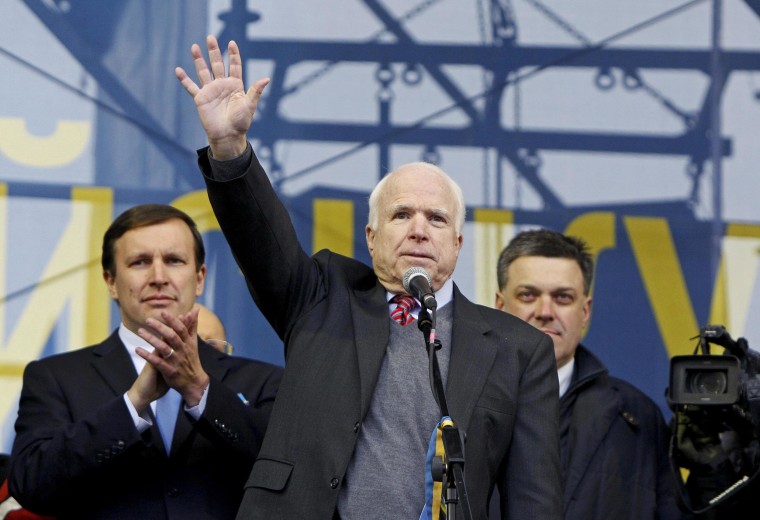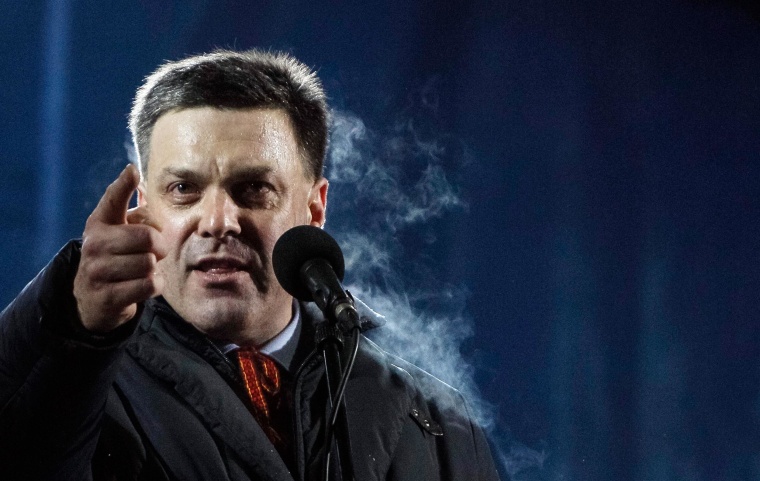The U.S. and Europe have been emphatic in their support of the new Ukrainian government – but a significant number of Washington's new bedfellows are members of what some experts class as extreme right-wing parties.
When Sen. John McCain traveled to Kiev in December, he told the crowd of 200,000 on Independence Square: "The free world is with you, America is with you, I am with you."
But among those stood next to the veteran Republican was Oleh Tyahnybok, leader of the Svoboda Party. Some policy analysts have called Svoboda ultra-nationalist and even neo-Nazi.

Svoboda, which means "Freedom," was given almost a quarter of the Cabinet positions in the interim government formed after the ouster of President Viktor Yanukovych in February.
The party's policies center around protecting the rights of what it calls “ethnic Ukrainians,” the preservation of the Ukrainian language and culture, and strict controls on immigration.
Although much of the more extreme content has now been removed from Svoboda’s leaflets, the European Parliament passed a resolution on Ukraine in 2012 that asked Kiev not to associate with the party on account of its “racist, anti-Semitic and xenophobic views.”
One of the party's lawmakers was appointed to run the powerful defense ministry before being forced out. However, Svoboda still holds one of the vice prime minister posts as well as the ministries of agriculture and the environment. According to Foreign Policy magazine, this represents the largest far-right representation in any government in Europe.
The appointment of Svoboda co-founder Andriy Parubiy to position of secretary of the Security and National Defense Committee has raised eyebrows. Although now a member of the liberal-conservative Fatherland party, Parubiy led anti-Yanukovych street militias in Kiev in the wake of protests that erupted in December.
His deputy is Dmytro Yarosh, leader of the even further right-wing group Pravyi Sektor, meaning "Right Sector." Its members formed the most militarized elements of the anti-government protest movement. Some of these demonstrators wore anti-Semitic insignia.
"The Parubiy appointment to such an important post should, alone, be cause for international outrage," Montreal-based research organization Centre for Research on Globalization said after the new government was appointed. It also described Svoboda as a "Neo-Nazi, ultra-right, [and] anti-Semitic."
But others say the influence of these groups is already waning.
Orysia Lutsevych is a research fellow at the Russia and Eurasia program at the London-based Chatham House think tank. She said the right-wing groups were given a disproportionate share of power in relation to public opinion because of their central role in Yanukovych's demise.
"The justification for having this ministries in the interim government, and let's not forget it is an interim government, was in response to their role in the protests," she said. "The Freedom Party and Right Sector got traction because they were very active in the protests and were able to get a response – people were tired of just singing songs. They played a role but that's it."
Lutsevych said the dwindling enthusiasm toward these groups can be seen in a recent poll that suggested Right Sector would get 1.2 percent of the vote. And Tyahnybok, who is running in the presidential elections on May 25, saw his support drop from 3.7 percent to just 2.5 percent in a recent poll.
Right-wing representation is further inflated because champion boxer turned politician Vitali Klitschko, at the time entertaining his own presidential aspirations, decided his UDAR party would not take any of the Cabinet positions.
Yanukovych's Party of Regions is also not involved in the coalition despite having the largest number of seats in Ukraine's parliament.
Even so, the influence of Svoboda and the Right Sector is minimal compared to that of the Fatherland party, which holds seven Cabinet positions, including leader Arseniy Yatsenyuk as prime minister.
Keen to strengthen this power base, the party's recently freed leader, Yulia Tymoshenko, announced her own presidential bid Thursday.
Svoboda's website outlines policies that are centered around persevering Ukraine's national identity, protecting the country's "living space," and imposing criminal penalties for any displays of "Ukrainophobia."
The German government described the party in August as "a right-wing populist and nationalist party with some extreme right-wing positions," according to broadcaster Deutsche Welle.
"What is politically correct and politically incorrect is very different in Ukraine than in the West"
The party is a member of the pan-European right-wing group the Alliance of European National Movements, which includes the anti-immigration British National Party and Italy's neo-fascist Tricolour Flame.
But Lutsevych said that while Svoboda does hold nationalist views, in the context of Eastern European or Russian politics they are not out of the ordinary. She said that past soundbites, such as Tyahnybok suggesting Kiev was run by a Jewish-Moscow mafia, are a result of a rough-and-ready political culture in Ukraine that will need time to iron itself out.
"What is politically correct and politically incorrect is very different in Ukraine than in the West," she said. "Ukraine has to change its political culture if it is going to align itself with the West."
The U.S. has thrown its weight behind the new Kiev administration, from McCain's overtures to a video of support from George Clooney. Earlier this month, Secretary of State John Kerry solidified the alliance with a visit to Kiev and the pledge of a $1 billion loan deal.
The development of the crisis as a proxy geopolitical conflict between Russia and the West has gathered pace significantly since then. But John Lough, another associate fellow at Chatham House, said that the U.S. and Europe had little choice strategically but to endorse the fragile coalition on offer, no matter what was on its fringes.
"Ukraine politics is in a state of flux," he said. "To be fair to the Ukrainians they had to form a government in extremely difficult circumstances, with strong rivalries between some of the opposition forces.
He said the position of the West has been simple: "We've got what we've got."

Lough added that any influence from the right has been exaggerated by Moscow, which denounced the uprising in Kiev as a fascist coup.
"If you actually look at the Russian propaganda in detail it bears very little relation to reality," he said. "There have been no pogroms, no Nazis roaming Crimea – this is the stuff of fantasy."
He did concede that there had been some "unfortunate incidents" - citing a video that emerged earlier this month showing Svoboda lawmaker Igor Miroshnichenko assaulting the boss of Ukraine's state TV station merely for broadcasting a speech by Vladimir Putin.
"But let’s face it," Lough added. "This is a country that's been in revolutionary turmoil. And on the other side, snipers were used to try to stop the events of the Maidan [revolutionary movement]. Are we going to criticize those brave Ukrainians who fought to free Ukraine from Yanukovych?"
Even if the influence of the right is overblown, any elements that do exist undoubtedly play into the hands of the Kremlin's attempts to unsettle Kiev.
The killing of prominent Right Sector figure Sashko Muzychko in a police shootout on Monday night exposed divisions in the coalition. Masked activists blocked the entrance to the parliament Thursday night to demand justice.
"Now is not the time for liberals"
Interim President Olexander Turchynov told parliament the next day that this blockade was "an attempt to destabilize the situation in Ukraine, in the very heart of Ukraine - Kiev."
"That is precisely the task that the Russian Federation's political leadership is giving to its special services," he said.
Keir Giles, director of the U.K.-based Conflict Studies Research Centre, said that in this climate of annexation and intimidation from Russia the appointment of people like Yarosh and Parubiy could actually be seen by Ukrainians as a positive.
"If you were a Ukrainian and you saw what you were up against, you would want someone like Parubiy," he said. "Now is not the time for liberals."